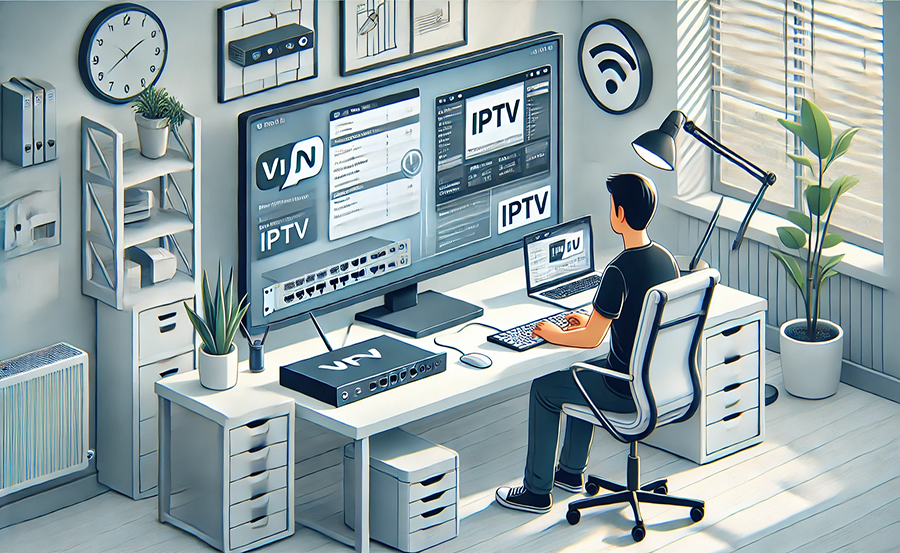In today’s rapidly evolving digital landscape, more people are turning to IPTV (Internet Protocol Television) to enjoy a seamless viewing experience. With Linux-powered devices being a popular choice for tech-savvy users, it’s crucial to understand how to fully optimize IPTV streaming performance. One effective way to achieve this is by using a VPN (Virtual Private Network), which provides both enhanced security and bypasses geographical restrictions. This article is a comprehensive guide designed to help you improve streaming performance on Linux with the best VPNs available.
Understanding IPTV and Its Popularity
IPTV is revolutionizing the way we consume media by delivering television content over the internet, bypassing traditional terrestrial, satellite, and cable formats. This digital transformation allows for more customizable viewing experiences, aligning perfectly with the preferences of modern TV watchers.
As more individuals switch to IPTV on Smart TV setups, the demand for efficient, high-quality streams has soared. IPTV’s broad compatibility with devices means that whether you’re watching through your Linux-powered PC or any other gadget, optimal performance is always important.
Expert Streaming Tip:
Stream the best content from the USA with Best IPTV for USA for unlimited entertainment options.
The potential to take IPTV to the Next Level of Fun is limitless. However, to unlock this potential, ensuring smooth, uninterrupted streaming is crucial. Here, we’ll explore how Linux users can enhance their IPTV experiences through the strategic use of VPNs.
Why We Need VPNs for IPTV Streaming on Linux
Using a VPN for IPTV isn’t just about security; it also offers various other benefits crucial for an optimal viewing experience. By masking your IP and providing encrypted connections, VPNs play a vital role in battling common streaming issues.
Benefits of VPNs for IPTV Users
Firstly, privacy is key. VPNs protect users from unwanted snooping by ISPs, allowing you to stream freely without anyone watching over your shoulder. This is particularly vital for Linux users who value security and open-source ethics.
Furthermore, ISPs often throttle speeds upon detecting high-bandwidth activities like streaming, which can cause annoying buffering. A VPN helps circumvent throttling, ensuring high-speed streaming for IPTV enthusiasts.
Geo-Restriction Bypassing
Perhaps one of the most exciting advantages is bypassing geo-restrictions. Many IPTV services limit access based on your region, but a VPN allows you to connect through servers in different countries, unlocking a world of content.
Whether you want to access content unavailable in your location or enjoy international IPTV services, a VPN provides the flexibility to do so, taking IPTV to the Next Level of Fun without borders.
How to Choose the Right VPN for IPTV on Linux
Picking the right VPN can significantly impact your streaming experience. It’s essential to consider various factors to ensure you select the best service tailored to your needs.
Speed and Stability
When streaming IPTV, speed and stability are paramount. A VPN with high-speed servers ensures that your streams are smooth, free from buffering, and maintain high quality.
Reliability is equally crucial. Ensure the VPN you choose has a proven track record of consistent performance without frequent disconnects, as this can disrupt your viewing experience.
Device Compatibility
Linux users need a VPN that supports a wide range of devices and is easy to configure on Linux systems. It’s essential to verify compatibility with your specific Linux distribution for hassle-free installation.
Additionally, look for VPNs offering multiple device connections, allowing you to secure not just your IPTV setup but other devices as well.
Customer Support
Quality customer support can be a lifesaver when facing installation or connection issues. Opt for VPNs with 24/7 customer service and a comprehensive knowledge base.
This can make transitions smoother and solve potential problems swiftly, helping you maximize your IPTV experience on Linux without unnecessary delays.
Top VPNs to Consider for Enhanced IPTV Streaming on Linux
After conducting extensive research and testing, here are some top VPNs known for their exceptional performance with IPTV streaming on Linux devices.
ExpressVPN
Known for its blazing-fast speeds and robust security features, ExpressVPN stands out as an excellent choice for IPTV users. With an easy-to-use Linux client, this VPN ensures consistent performance even during peak times.
Their impressive range of global servers allows access to a wide array of geo-restricted content, making the IPTV experience as diverse as possible.
NordVPN
NordVPN is synonymous with reliability and security. This VPN boasts specialized servers optimized for streaming, ensuring zero-buffering and high-definition video playback.
With a straightforward command-line client for Linux, NordVPN caters to tech enthusiasts looking for efficiency and ease of use.
CyberGhost
CyberGhost provides a user-friendly experience coupled with exceptional streaming capabilities. Its strong performance on Linux platforms makes it a favorite among IPTV fans.
Offering dedicated streaming servers, this VPN is ideal for those who want to enjoy IPTV without the hassle of manual server selection.
Steps to Set Up a VPN for IPTV on Linux
Setting up a VPN for IPTV is a straightforward process, even on Linux systems. Here’s a quick guide to get you started.
Choose and Install Your VPN
First, select a VPN that suits your needs based on the criteria mentioned above. Download the Linux client from the VPN provider’s website.
Most VPNs provide detailed installation instructions specific to different Linux distributions, ensuring a smooth setup process tailored to your system.
Configure VPN Settings
Once installed, configure your VPN settings by logging in with your account credentials. Remember to choose a server location optimized for streaming to get the best performance.
Many VPNs offer automatic server selection based on speed, which can be particularly useful for IPTV users who prioritize quality streaming.
Connect and Enjoy
After configuration, connect to your chosen VPN server. Once connected, you can begin enjoying your IPTV service with improved performance and access to a broader range of content.
Enjoy the elevated IPTV viewing experience on your Linux device, protected by your VPN’s added layer of security, making streaming even more pleasurable.
Common Challenges and Solutions
While using a VPN for IPTV, you might encounter certain challenges. Here are practical solutions to the most common issues faced by Linux users.
Connection Drops
If you notice frequent connection drops, verify that your VPN client is up-to-date. Outdated software can often lead to stability issues.
Consider switching to a different server with better performance or utilize a hard-wired connection to your Linux device for a more stable internet experience.
Buffering Issues
Buffering often stems from server congestion or low speeds. Select a server geographically closer to your location or try switching to a protocol optimized for speed.
Also, ensure your internet speed is adequate for streaming and that no other applications are consuming too much bandwidth concurrently.
Difficulty in Setup
Installing VPN clients on Linux can seem daunting. If issues arise, consult the VPN provider’s support resources or reach out for customer support aid.
Common resources include installation scripts, setup guides, and community forums offering shared experiences and solutions.
FAQs About Improving IPTV Streaming with VPNs on Linux

Is it legal to use a VPN with IPTV?
Yes, using a VPN with IPTV is generally legal. However, it’s essential to ensure that the IPTV service you use is legitimate and complies with all copyright laws.
Can a VPN affect streaming quality?
A good-quality VPN should improve rather than diminish your streaming experience by preventing ISP throttling and offering access to faster servers.
What should I do if my VPN slows my internet speed?
Try switching to a different server or change the VPN protocol. Additionally, confirm your internet service is functioning correctly, and no other applications are using excessive bandwidth.
How do VPNs enhance security for IPTV users?
VPNs encrypt your internet traffic, protecting your data from hackers and preventing ISPs from tracking your online activities, thus enhancing your security when streaming IPTV.
Will any VPN work with IPTV on Linux?
Not all VPNs provide the same level of performance or compatibility. It’s crucial to select those specifically optimized for streaming and offer Linux support for the best results.
How many simultaneous device connections do VPNs typically allow?
Most VPNs allow multiple simultaneous connections, usually ranging from 5 to 7 devices. This flexibility lets you secure your IPTV along with other gadgets at home.
Are there free VPNs suitable for IPTV on Linux?
While free VPNs exist, they typically come with limitations such as slower speeds and bandwidth caps, which might not provide the best experience for IPTV streaming.
Embrace the change and elevate your IPTV experience with a VPN. Enjoy the unbounded possibilities of IPTV on Linux and take your viewing pleasure to new heights. As technology evolves, so does our ability to refine and enhance the ways we enjoy digital entertainment.
The Smart Future: How IoT and IPTV Are Revolutionizing Home Entertainment





